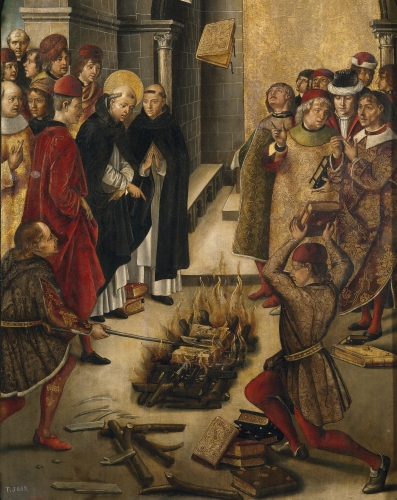Albigensianism
 A neo-Manichaean sect, associated with the Catharist (Puritan) movement, that flourished in southern France in the 12th and 13th centuries. They believed in a good spirit who created the spiritual, and in an evil spirit who created the material world, including the human body, which is therefore under his control. The good spirit created the soul but the evil one imprisoned it in the body, which is evil from its source. To deliver souls from this evil and punishment, the good spirit, God, sent Jesus Christ who is only a creature. Since the body is evil He could assume only a celestial one. They commended suicide especially by starvation, their endura, and in general, the extinction of human life, and advocated abstention from marriage, preferring concubinage as less evil. As they were a menace to governments and society generally, and resisted all attempts at their conversion, a crusade was organized by barons from France, Germany, and Belgium against Raymond VI, Count of Toulouse, who favored them. After defeating them with great carnage the barons, contrary to the designs of Pope Innocent III, continued a war of conquest. The sect disappeared in the 14th century. For a more detailed treatment of this, see articles from the Catholic Encyclopedia and/or the Illustrated Catholic Family Annual.
A neo-Manichaean sect, associated with the Catharist (Puritan) movement, that flourished in southern France in the 12th and 13th centuries. They believed in a good spirit who created the spiritual, and in an evil spirit who created the material world, including the human body, which is therefore under his control. The good spirit created the soul but the evil one imprisoned it in the body, which is evil from its source. To deliver souls from this evil and punishment, the good spirit, God, sent Jesus Christ who is only a creature. Since the body is evil He could assume only a celestial one. They commended suicide especially by starvation, their endura, and in general, the extinction of human life, and advocated abstention from marriage, preferring concubinage as less evil. As they were a menace to governments and society generally, and resisted all attempts at their conversion, a crusade was organized by barons from France, Germany, and Belgium against Raymond VI, Count of Toulouse, who favored them. After defeating them with great carnage the barons, contrary to the designs of Pope Innocent III, continued a war of conquest. The sect disappeared in the 14th century. For a more detailed treatment of this, see articles from the Catholic Encyclopedia and/or the Illustrated Catholic Family Annual.
- from New Catholic Dictionary; this is part of a series of articles on heresies and blasphemies
 A neo-Manichaean sect, associated with the Catharist (Puritan) movement, that flourished in southern France in the 12th and 13th centuries. They believed in a good spirit who created the spiritual, and in an evil spirit who created the material world, including the human body, which is therefore under his control. The good spirit created the soul but the evil one imprisoned it in the body, which is evil from its source. To deliver souls from this evil and punishment, the good spirit, God, sent Jesus Christ who is only a creature. Since the body is evil He could assume only a celestial one. They commended suicide especially by starvation, their endura, and in general, the extinction of human life, and advocated abstention from marriage, preferring concubinage as less evil. As they were a menace to governments and society generally, and resisted all attempts at their conversion, a crusade was organized by barons from France, Germany, and Belgium against Raymond VI, Count of Toulouse, who favored them. After defeating them with great carnage the barons, contrary to the designs of Pope Innocent III, continued a war of conquest. The sect disappeared in the 14th century. For a more detailed treatment of this, see articles from the Catholic Encyclopedia and/or the Illustrated Catholic Family Annual.
A neo-Manichaean sect, associated with the Catharist (Puritan) movement, that flourished in southern France in the 12th and 13th centuries. They believed in a good spirit who created the spiritual, and in an evil spirit who created the material world, including the human body, which is therefore under his control. The good spirit created the soul but the evil one imprisoned it in the body, which is evil from its source. To deliver souls from this evil and punishment, the good spirit, God, sent Jesus Christ who is only a creature. Since the body is evil He could assume only a celestial one. They commended suicide especially by starvation, their endura, and in general, the extinction of human life, and advocated abstention from marriage, preferring concubinage as less evil. As they were a menace to governments and society generally, and resisted all attempts at their conversion, a crusade was organized by barons from France, Germany, and Belgium against Raymond VI, Count of Toulouse, who favored them. After defeating them with great carnage the barons, contrary to the designs of Pope Innocent III, continued a war of conquest. The sect disappeared in the 14th century. For a more detailed treatment of this, see articles from the Catholic Encyclopedia and/or the Illustrated Catholic Family Annual.